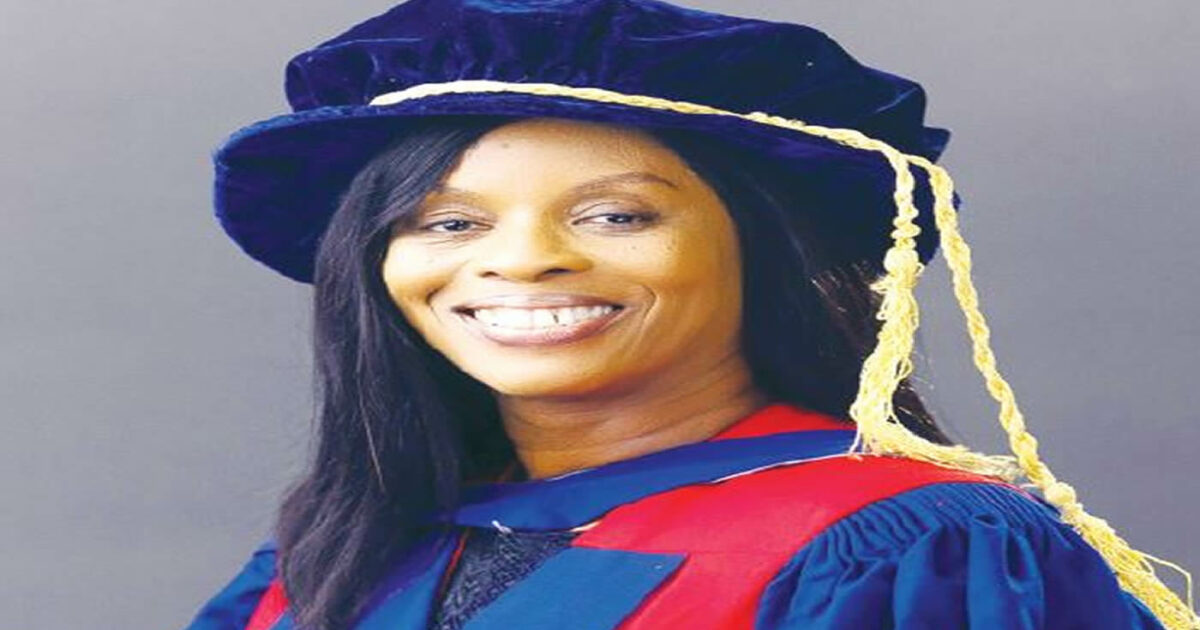In this interview, Professor of Intellectual Property, Commercial and Industrial Law at the University of Lagos, Prof. Adejoke Oyewunmi, tells GRACE EDEMA that Nigeria’s intellectual property laws are struggling to keep pace with fast-evolving digital technologies
Can you summarise the core themes and motivations behind your inaugural lecture on intellectual property and digital technology?
The inaugural lecture titled “Intellectual Property and Digital Technology: Navigating the Pathway to a Fit for Purpose Legal Regime in Nigeria” is my reflection on the nature and extent of the suitability of the Nigerian law of Intellectual Property (IP) to address, in a balanced and responsive manner, the issues posed by digital technology for the Nigerian IP eco-system. The copyright, trademark, and patent systems have all been revolutionised in diverse ways, affecting education, entertainment, and business, among others. The lecture examined opportunities and challenges posed to IP owners, particularly in the context of commercialisation, management and enforcement of their rights. While the technology has facilitated access, it has also resulted in large-scale infringement, which is extremely damaging to right owners. UNESCO estimates that 50 to 75 per cent of the revenue of the African film and audiovisual industries is lost to piracy, with other copyright, trademark, and traditional knowledge owners being similarly impacted. Side by side with the dilemma of right owners, the lecture explored public interest and consumer protection dimensions resulting from the deployment of digital technology. These include the conundrum of users who hitherto enjoyed certain levels of free and legitimate access to the benefits of creative and inventive outputs, for purposes deemed to be in the public interest. The Nigerian legal and regulatory frameworks were largely designed for a different technological era. Still, some have gradually evolved to address contemporary issues better, while other sectors have been largely left untouched. The inaugural lecture highlighted my over 30 years’ trajectory in this important field and my contributions to knowledge aimed at unearthing gaps and dysfunctionalities in the law and the evolution of a fit-for-purpose IP legal regime in the digital age.
What inspired your focus on the intersection between intellectual property and digital technology? Was there a particular case or experience that triggered this interest?
The lecture was inspired by multiple factors and experiences. The seed was first planted in 2000, when, as a graduate student in the USA, I took very enriching classes on the possibilities of technology, as well as its downsides, especially in the wake of the then fearfully anticipated
“Millennium Y2K bug”. I also witnessed first-hand access to academic resources through online library facilities, and the implications for owners and users of copyright works involved.
An additional factor was my discovery that on subsequent visits abroad, no one asked me for “Nigerian Home Video cassettes” anymore because they could watch movies online. All these novel developments awakened my intellectual curiosity about the impact of digital technology on the Nigerian IP landscape, and I therefore opted to carry out my PhD research in this area.
What are the key issues about intellectual property that Nigerians are generally unaware of? Are there misconceptions or blind spots, especially among content creators, entrepreneurs, and tech innovators?
IP may be likened to a gold mine whose huge potential is yet to be fully maximised. Nigeria is very richly endowed in this area, not only in terms of the conventional IP sectors like music, films, book publishing, but also in other lesser known aspects like geographical indications, trade marks and traditional knowledge. Digital technology has facilitated the commercial exploitation of some of our indigenous textiles, foods, crafts and other resources. This is not necessarily a bad thing, except to the extent that the exploitation is being done without recourse to the owners or originators for their consent or possible benefit-sharing. Sometimes, it is about inadequate awareness, while at other times, right owners appear helpless about how best to address the challenges and maximise their opportunities. Mind you, the technology revolution has not abated. Rather, it is evolving ever more rapidly, and the developments are now tending more towards data-driven digital technologies such as Artificial Intelligence, Blockchain, Cloud Computing, and Big Data. A 2019 World Intellectual Property Organisation Report provides an insight into the phenomenal global growth in the numbers and types of Artificial Intelligence-related inventions relevant to key sectors like telecommunications, transportation, life and medical sciences, banking, entertainment and agriculture, which are all high-priority areas for Nigeria. Also, there is the dimension of digital assets, including blockchain technology and non-fungible tokens (NFTs). So far, we have only focused on Bitcoin and Ethereum, which, though representing the most popular and valuable examples of digital assets, actually go beyond cryptocurrencies to extend to digital representations of art, music, and videos. All these aspects are already creeping up on us.
In what ways does Nigeria’s current legal framework fall short in protecting intellectual property in the digital age? What loopholes or outdated structures are proving most problematic?
Well, intellectual property is a broad subject, so I will answer this way, that in some areas, such as copyright, recent law reform (Copyright Act, 2022) has significantly reduced the gaps and ensured that the law is fit for purpose. We now need to concentrate on implementation, and I must acknowledge the initiatives of the Nigerian Copyright Commission in this regard. For trademarks, there are ongoing efforts to digitalise the processes of the Registry, but this has yet to be concluded. Moreover, the main statute on trademarks, which was enacted as far back as 1965, in a different technological era, is due for an overhaul. Although my lecture identified a few law reform interventions, including the Cybercrime Act (2015) and the Business Facilitations Act (2022), these fall far short of achieving the imperative of holistic reform to achieve a fit-for-purpose legal regime. For purposes of legal protection of Geographical Indications, there are ongoing reform efforts which need to be expedited, while the safeguarding of the interests of owners of genetic resources and traditional knowledge from biopiracy through the deployment of the patent system and other means is yet to be addressed. These are just a few of the outstanding areas.
How can Nigeria effectively navigate the evolving relationship between intellectual property and digital technology, and what legal, institutional, or societal steps must be taken to build a fit-for-purpose regime?
The opportunities for economic empowerment and attainment of cultural renaissance and global renown need to be leveraged consciously and deliberately. Dysfunctionalities need to be addressed, including through law reform and enforcement initiatives. There has to be a close partnership between the town and gown. Many of the issues have been unveiled through research by academics and IP institutions, so policy-makers need to engage with them and also with right owners to ensure that there is, in every area, a fit-for-purpose regime.
What specific areas or industries reflect the strongest convergence between intellectual property and digital technology? Are we talking about music streaming, software development, Nollywood, fintech, or something else?
To be honest with you, no area is left out. The entertainment sector appears to be the most obvious because of its prominence and significance to national development, as it attracts foreign investment, including through streaming platforms like Netflix and Amazon Prime, which continue to invest in the sector. However, other sectors such as computer software, publishing- especially of educational resources, patents for inventive outputs, including those related to inventions of technological tools and devices, trademarks (in the context of e-commerce) and others are also of critical importance and need to be nurtured through a fit and effective legal framework.
Do you think the average Nigerian innovator and content creator understands the value of intellectual property protection? How can awareness be improved, especially at the grassroots or startup levels?
There is a lot more awareness now than we had in the past, but we are still not there yet. I recommend that awareness should start early, through educational and training institutions.
More intellectual property clubs should be established, while the subject should be included in the curriculum of all faculties represented in the intellectual property value-chain at undergraduate and postgraduate levels. These go beyond those involved in IP management and enforcement, such as Law faculties and Management Sciences, but extend to those who generate IP, including in the Arts, Mass Communication, Physical, Chemical and Environmental Sciences, Engineering and Pharmacy/Medical fields. Business and manufacturing clusters engaged in indigenous textile, leather, crafts and other products, as well as entertainment, publishing and other creative sectors, should also be reached with the gospel of IP.
What role can academic institutions, lawmakers, and the tech industry play in shaping an adaptive IP legal regime?
Well, each has its unique role. While teaching and carrying out research, academic institutions should ensure that their curriculum is dynamic and up-to-date with contemporary and emerging issues. In this day and age, all institutions should have IP in their curriculum in one form or another, because this subject is the currency of this technology age. Lawmakers should be at the forefront of making laws that are abreast of and responsive to societal practices and needs of IP sectors, while the tech industry players need to continually develop new inventions that address societal challenges in different spheres. They also need to speak up about the issues and challenges they face, so that these can be properly addressed through research as well as law and policy initiatives. Perhaps most importantly, there should be a healthy collaboration between these diverse parties where they rub minds and exchange knowledge.
As AI and emerging technologies gain ground, what new IP challenges should Nigeria be preparing for?
These technologies are extremely valuable in diverse sectors that are of critical socio-importance to Nigeria, but also present unique challenges, including the violation of the rights of others. It is therefore necessary to direct our minds to addressing issues around liability for wrongful or harmful uses. Also, validity, ownership and scope of rights deriving from AI outputs, duration of protection and other issues need to be addressed. Our engagement with digital assets has seen Nigeria ranking high in NFT adoption, including in the arts sector, as evidenced by the 2021 pioneering digital auction of the work of Nigerian digital artist Osinachi as an NFT by Christie’s in Europe. So, we need a presently fit and future-ready IP system to address issues of ownership, liability and other aspects that will necessarily arise as we engage with these technologies.
How can creators and innovators protect their works in the digital space, especially with the rise of content theft online?
Technology, complemented by law, remains critical. Digital rights management (DRMs) and other technology tools perform access and usage control functions, while the law safeguards the deployment of technology. An example is the recently promulgated Copyright Act of 2022, which prohibits the circumvention of technological measures used to safeguard IP works, in line with international best practices. Legal provisions to take down infringing works from websites, as well as dispute resolution frameworks, have also been put in place; therefore, right owners and their lawyers now have more tools to work with to safeguard their rights in the digital environment.
What is your message to young Nigerian creatives, tech innovators, and policymakers? How should they approach the future of IP in a digitally driven economy?
Young creatives and tech innovators should key into the technology age fully to avail themselves of its vast potential, while taking necessary steps to safeguard their rights within the ambit of the law. For policy-makers, I would urge them to be responsive to the needs of this sector and to promote collaboration with all stakeholders to ensure a cross-fertilisation of ideas aimed at ensuring a fit-for-purpose regime where creativity and innovation thrive.





